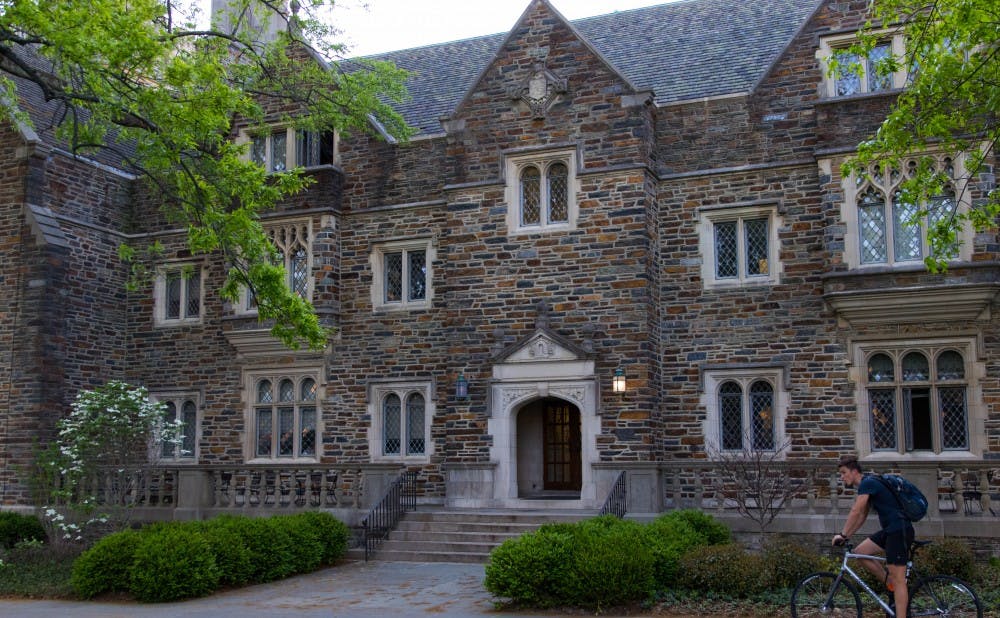Arts & Sciences Council met Thursday afternoon to discuss feedback about end-of-semester student teaching evaluations and potential incentives to encourage student participation.
Student teaching evaluations
Greg Samanez-Larkin, chair of the committee on assessments and Jack H. Neely, associate professor of psychology and neuroscience, presented a report on student course evaluations, which were recently overhauled with a new platform and shortened questionnaire that changed the wording and order of questions.
The committee on assessments was created in 2021 to make recommendations on improving the response rate and overall usefulness of student teaching evaluations. These changes were guided by existing literature on bias in student teaching evaluations and how to improve the quality of evaluations.
Samanez-Larkin said the committee is exploring ways to incentivize students to complete their course evaluations, hoping to add to the quality and quantity of evaluation data.
One of the committee’s initial recommendations was to reward students who complete the evaluations by releasing their grades three days before students who do not. Samanez-Larkin noted that this is a common practice at many peer institutions, whose response rates, usually higher than 80%, are much higher than Duke’s 50%.
Although this strategy works at other universities, Samanez-Larkin noted that it would be difficult for Duke to implement this practice, since Duke faculty members are not currently required to report grades on a specific day.
“We ran into a lot of technical challenges and implementing that, it's actually impossible,” he said.
Samanez-Larkin pointed to Duke’s current system, in which grades are released once entered. Meanwhile, faculty members at other universities have a grade release day after they enter grades.
Those faculty members may accelerate the release of grades, but under Duke’s current system, Duke faculty members cannot reward students with an “early release” without delaying grade releases for students who do not complete course evaluations.
“Punishing people for not doing things is very different than rewarding them for engaging,” he said.
The committee also recommended that student course evaluations continue to be publicly available to students as a tool to solicit feedback from peers before they commit to signing up for a particular course. The committee approved a proposal to transition from an opt-in system, in which faculty members fill out a form to share evaluation information with students, to an opt-out system.
Samanez-Larkin concluded his presentation by noting that he hopes the committee’s changes motivate students to invest in Duke’s course evaluation system. He informally compared the evaluation form, which he regarded as a “public good just for the sake of students,” to websites like Rate My Professor, which have “far fewer reviews of faculty.”
The committee is also tentatively considering giving students who complete most of their evaluations a 5-minute head start when registering for classes next semester. Samanez-Larkin describes the practice as a low-cost way to increase participation rates for course evaluations since it will impact students’ future courses, not the courses being evaluated.
Samanez-Larkin suggested that Arts & Sciences Council could expect a fully fleshed-out proposal to vote on in the fall of 2024.
In other business
Mohamed Noor, interim vice provost for academic affairs, updated the Arts & Sciences Council on the development of a new peer evaluation program, through which professors observe and provide feedback to their colleagues’ teaching.
According to Noor, the program's goal is to provide another piece of data to consider when reviewing faculty appointments, promotions and tenure.
Following the pilot evaluations, Noor described “high enthusiasm [for the program from the Appointment, Promotion and Tenure committee] because there’s a lot of well-understood biases, especially with student course evaluations, and the knowledge that that is primarily what is used right now in the context of teaching evaluations.”
At the end of the meeting, Joshua Socolar, chair of the Arts & Sciences Council, presented two bylaw amendments that the council will vote on at their last meeting in May phasing out the Information Technology Committee and revising the Budget Committee’s scope.
Get The Chronicle straight to your inbox
Signup for our weekly newsletter. Cancel at any time.

Jack Sabo is a Trinity first-year and a staff reporter for the news department.

